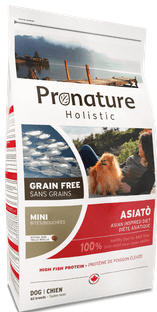Pronature Holistic Grain Free Dog Food Review (Dry)

DogFoodAdvisor is reader supported See how
All reviews are 100% impartial but if you buy using links on this page, we may earn a referral fee.
Review of Pronature Holistic Grain Free Dry Dog Food
Pronature Holistic Grain Free Dog Food receives the Advisor’s top rating of 5 stars.
The Pronature Holistic Grain Free product line includes the 5 dry dog foods listed below.
Each recipe includes its AAFCO nutrient profile when available… Growth (puppy), Maintenance (adult), All Life Stages, Supplemental or Unspecified.
| Product | Rating | AAFCO |
|---|---|---|
| Pronature Holistic Grain-Free Nordiko Large Bites | 5 | A |
| Pronature Holistic Grain-Free Nordiko Small Bites | 5 | A |
| Pronature Holistic Grain-Free Mediteranea Large Bites | 5 | A |
| Pronature Holistic Grain-Free Mediteranea Small Bites | 5 | A |
| Pronature Holistic Grain-Free Asiato Mini Bites | 5 | A |
Recipe and Label Analysis
Pronature Holistic Grain-Free Asiato Mini Bites was selected to represent the other products in the line for detailed recipe and nutrient analysis.
Label and nutrient data below are calculated using dry matter basis.
Pronature Holistic Grain Free Asiato Mini Bites
Estimated Dry Matter Nutrient Content
Protein
Fat
CarbsCarbohydrates
Menhaden fish meal, whitefish, lentils, sweet potatoes, vegetable oil (preserved with mixed tocopherols and citric acid), tapioca, salmon meal, natural flavor, flaxseed, pea fiber, carrots, coconut, dried kelp, minerals [calcium carbonate, ferrous sulfate, zinc oxide, manganous oxide, zinc proteinate, manganese proteinate, copper proteinate, sodium selenite, calcium iodate], vitamins [alpha-tocopherol acetate (a source of vitamin E), nicotinic acid, d-calcium pantothenate, vitamin A supplement, cholecalciferol (a source of vitamin D3), thiamine mononitrate, biotin, riboflavin, pyridoxine hydrochloride, vitamin B12 supplement, folic acid], monosodium phosphate, choline chloride, spearmint, ginger, shiitake mushroom, ascorbic acid (vitamin C), Yucca schidigera extract, dried papaya, rosemary extract
Fiber (estimated dry matter content) = 4.5%
Red denotes any controversial items
| Estimated Nutrient Content | |||
|---|---|---|---|
| Method | Protein | Fat | Carbs |
| Guaranteed Analysis | 30% | 20% | NA |
| Dry Matter Basis | 33% | 22% | 37% |
| Calorie Weighted Basis | 27% | 44% | 30% |
Ingredient Analysis
The first ingredient in this dog food is menhaden fish meal. Because it is considered a meat concentrate, fish meal contains almost 300% more protein than fresh fish itself.
Menhaden are small ocean fish related to herring. They’re rich in protein and omega-3 fatty acids. What’s more, in their mid-depth habitat, menhaden are not exposed to mercury contamination as can be typical with deep water species.
This item is typically obtained from the “clean, dried, ground tissue of undecomposed whole fish and fish cuttings” of commercial fish operations.1
The second ingredient is whitefish, a marine or freshwater species native to Canada and the California coast. Although it is a quality item, raw fish contains up to 73% water. After cooking, most of that moisture is lost, reducing the meat content to just a fraction of its original weight.
After processing, this item would probably account for a smaller part of the total content of the finished product.
The third ingredient includes lentils, which are a quality source of carbohydrates. Plus (like all legumes) they’re rich in natural fiber.
However, lentils contain about 25% protein, a factor that must be considered when judging the actual meat content of this dog food.
The next ingredient is sweet potato. Sweet potatoes are a gluten-free source of complex carbohydrates in dog food. They are naturally rich in dietary fiber and beta carotene.
The fifth ingredient is vegetable oil, a generic oil of unknown origin. The ratio of omega-6 to omega-3 fats in any oil is nutritionally critical and can vary significantly (depending on the source).
Without knowing more, it’s impossible to judge the quality of an item so vaguely described. However, compared to a named animal fat, a generic vegetable oil cannot be considered a quality ingredient.
The sixth ingredient is tapioca, a gluten-free, starchy carbohydrate extract made from the root of the cassava plant.
The seventh ingredient is salmon meal, another protein-rich meat concentrate.
After the natural flavor, we find flaxseed, one of the best plant sources of healthy omega-3 fatty acids. Provided they’ve first been ground into a meal, flax seeds are also rich in soluble fiber.
However, flaxseed contains about 19% protein, a factor that must be considered when judging the actual meat content of this dog food.
From here, the list goes on to include a number of other items.
But to be realistic, ingredients located this far down the list (other than nutritional supplements) are not likely to affect the overall rating of this product.
With 4 notable exceptions…
First, we find pea fiber, a mixture of both soluble and insoluble dietary fiber derived from pea hulls. Aside from the usual benefits of fiber, this agricultural by-product provides no other nutritional value to a dog.
Next, we note the inclusion of coconut. Depending upon the quality of the raw material, coconut is rich in medium chain fatty acids.
Medium-chain triglycerides have been shown to improve cognitive function in older dogs.2
Because of its proven safety3 as well as its potential to help in the treatment of canine cognitive dysfunction syndrome (CDS) and chronic skin disorders, MCT can be considered a positive addition to this recipe.
In addition, we find no mention of probiotics, friendly bacteria applied to the surface of the kibble after processing to help with digestion.
And lastly, this food contains chelated minerals, minerals that have been chemically attached to protein. This makes them easier to absorb. Chelated minerals are usually found in better dog foods.
Nutrient Analysis
Based on its ingredients alone, Pronature Holistic Grain Free Dog Food looks like an above-average dry product.
The dashboard displays a dry matter protein reading of 33%, a fat level of 22% and estimated carbohydrates of about 36%.
As a group, the brand features an average protein content of 33% and a mean fat level of 22%. Together, these figures suggest a carbohydrate content of 36% for the overall product line.
And a fat-to-protein ratio of about 67%.
Which means this Pronature product line contains…
Above-average protein. Above-average fat. And below-average carbs when compared to a typical kibble.
Even when you consider the protein-boosting effect of the lentils and flaxseed, this looks like the profile of a dry dog food containing a significant amount of meat.
Our Rating of Pronature Holistic Grain Free Dog Food
Pronature Holistic Grain Free is a dry dog food using a significant amount of named meat meals as its dominant source of animal protein, thus earning the brand 5 stars.
Enthusiastically recommended.
Has Pronature Brand Dog Food Been Recalled?
The following automated list (if present) includes all dog food recalls since 2009 related to Pronature.
No recalls noted.
You can view a complete list of all dog food recalls since 2009 here.
Get Free Recall Alerts
Get free dog food recall alerts sent to you by email. Subscribe to The Advisor’s recall notification list.
More Pronature Brand Reviews
The following Pronature dog food reviews are also posted on this website:
Compare This Dog Food
How does this brand compare with The Dog Food Advisor's most recommended brands?
Sources
A Final Word
The Dog Food Advisor does not accept money, gifts, samples or other incentives in exchange for special consideration in preparing our reviews.
However, we do receive a referral fee from online retailers (like Chewy or Amazon) and from sellers of perishable pet food when readers click over to their websites from ours. This helps cover the cost of operation of our free blog. Thanks for your support.
For more information, please visit our Disclaimer and Disclosure page.




